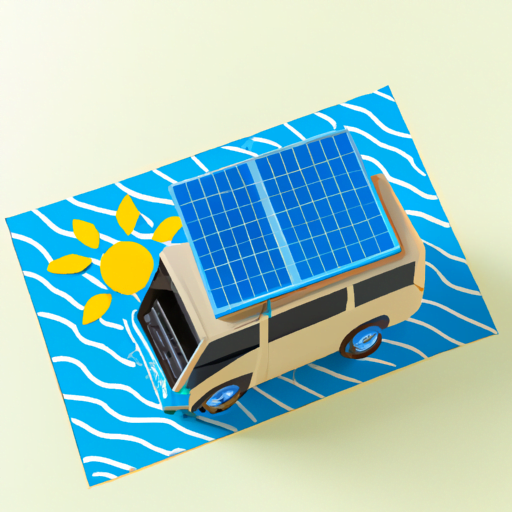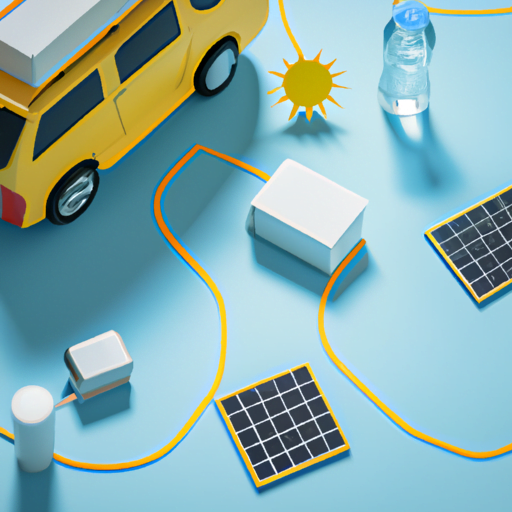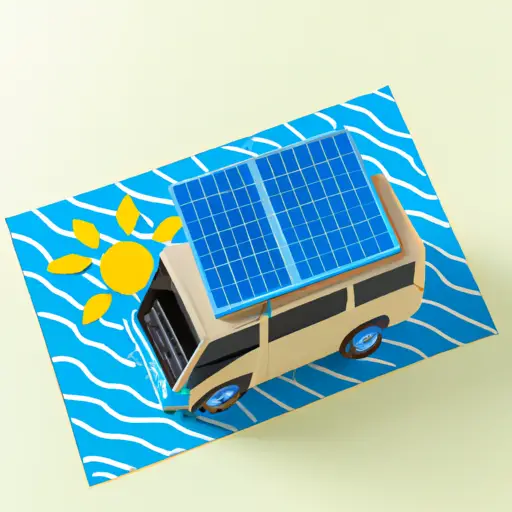Have you ever wondered what the ultimate power source is for vanlife? Given the growing popularity of off-grid living, it’s no surprise that many vanlifers are constantly seeking the best power solution for their nomadic lifestyle. In this article, we will delve into the various options available and explore the pros and cons of each. By the end, you will have a better understanding of the ultimate power source for your vanlife adventures.
When it comes to vanlife, being off the grid allows you to explore remote or secluded areas without worrying about access to traditional sources of electricity. The freedom that off-grid living offers is undoubtedly a huge draw for many adventurous souls. But with this freedom comes the challenge of finding a reliable power source that can fulfill your energy needs. Solar power, batteries, generators, and even alternative energy sources like wind turbines are options worth considering.
Solar power is often hailed as the go-to choice for vanlifers, offering a clean and renewable energy source. With the advancements in solar technology, it has become increasingly affordable and efficient. However, it may not be suitable for everyone, depending on your energy requirements and the climate you will be traveling in. Battery systems are another popular choice, providing a reliable and easily expandable power source. However, they do require periodic recharging, which can be a challenge during long periods of cloudy weather or limited access to energy sources.
In the upcoming sections, we will delve into each power source in more detail, exploring their strengths and weaknesses, as well as discussing factors to consider when choosing the ultimate power source for your vanlife. Whether you prioritize sustainability, portability, or cost-effectiveness, this article will equip you with the knowledge needed to make an informed decision. So, let’s dive in and discover the power source that will best accompany you on your vanlife adventures.

Introduction to Vanlife
Vanlife has become increasingly popular in recent years as more people seek freedom and adventure on the open road. Living in a van offers a nomadic lifestyle, allowing individuals to explore new places, experience unique cultures, and escape the pressures of conventional living. However, this type of lifestyle comes with the challenge of powering your van while living off the grid. In this article, we will explore the different power sources available for vanlife, with a focus on the ultimate power source: solar power.
What is Vanlife?
Vanlife is a lifestyle choice where individuals choose to live and travel in a van rather than a traditional home. It involves converting a van into a mobile living space, complete with amenities such as a bed, kitchen, and sometimes even a bathroom. Vanlifers often travel to different locations, seeking adventure, and work remotely to sustain their way of life.
The appeal of Vanlife
There are numerous reasons why people are drawn to the vanlife lifestyle. First and foremost, it offers freedom and flexibility. With no fixed address, vanlifers can wake up to new surroundings every day, explore stunning landscapes, and immerse themselves in nature. Vanlife also allows individuals to simplify their lives and break free from the constraints of material possessions, leading to a more minimalist and fulfilling existence.
The challenges of Vanlife
Living in a van does come with its fair share of challenges, one of which is the need for a reliable power source. Unlike conventional houses that are connected to the electrical grid, vanlife requires alternative energy solutions to power appliances, charge electronic devices, and provide lighting. This is where the concept of off-grid living comes into play.
Understanding Off-Grid Living
Definition of off-grid living
Off-grid living refers to living without any reliance on public utilities such as electricity, water, and gas. It involves generating and managing your own resources in a self-sustainable manner. For vanlifers, off-grid living is essential as they often find themselves in remote locations where connecting to the grid is not an option.
Benefits of off-grid living
Off-grid living offers several advantages, including reduced costs, increased self-sufficiency, and a smaller environmental footprint. By generating your own power and managing resources efficiently, vanlifers can minimize their reliance on fossil fuels and contribute to a more sustainable way of life. Additionally, by detaching from traditional utility systems, individuals have the freedom to live anywhere, unrestricted by the availability of infrastructure.
Technologies and strategies for off-grid living
Off-grid living requires a combination of technologies and strategies to ensure a sustainable and comfortable lifestyle. Key components include power sources, water management systems, waste disposal solutions, and energy-efficient appliances. However, for the purpose of this article, we will focus specifically on power sources for vanlife.
Power Sources for Vanlife
Importance of reliable power sources
A reliable power source is crucial for vanlifers as it provides the energy needed to run essential appliances, charge devices, and maintain a comfortable living environment. Without a dependable power source, vanlifers may find themselves restricted in terms of where they can park and how they can live in their vans. Therefore, choosing the right power source is of utmost importance.
Comparison of different power sources
There are several power sources available for vanlife, each with its own advantages and disadvantages. The most common options include solar power, battery systems, wind power, hydroelectric power, and portable generators. However, solar power stands out as the ultimate power source for vanlife due to its numerous benefits and increased accessibility.
Factors to consider in choosing a power source
When selecting a power source for your van, there are several factors to consider. These include power requirements, space availability, installation complexity, maintenance needs, and budget. It is essential to evaluate each power source option against these criteria to ensure it aligns with your specific vanlife needs and preferences.

Solar Power: The Ultimate Power Source
Advantages of solar power for Vanlife
Solar power has emerged as the ultimate power source for vanlife due to its numerous advantages. First and foremost, it is a renewable and clean energy source, making it environmentally friendly and sustainable. Additionally, solar power is abundant, especially in sunny regions, ensuring a consistent and reliable energy supply. Unlike other power sources, solar power is also silent, allowing vanlifers to enjoy a peaceful and undisturbed living environment.
Components of a solar power system
A solar power system typically consists of three main components: solar panels, a charge controller, and batteries. Solar panels capture sunlight and convert it into electricity through a process known as the photovoltaic effect. The charge controller regulates the flow of energy to prevent overcharging and protect the batteries. Finally, the batteries store the energy generated by the solar panels for later use when the sun is not shining.
Sizing and installation considerations
When installing a solar power system in your van, it is important to consider the size and capacity of the system. The power requirements of your van, including appliances, lights, and electronic devices, will determine the number and size of solar panels needed. Additionally, the available roof space and weight restrictions of your van should be taken into account during installation. It is recommended to consult with a professional or do thorough research to ensure the proper sizing and installation of your solar power system.
Battery Solutions for Vanlife
Types of batteries for Vanlife
Batteries are an essential component of any vanlife power system, as they store the energy generated by the solar panels for later use. There are several types of batteries commonly used in vanlife, including lead-acid, lithium-ion, and gel batteries. Each type has its own advantages and disadvantages in terms of capacity, performance, weight, maintenance needs, and cost.
Capacity and performance factors
When selecting a battery for your vanlife setup, it is important to consider its capacity and performance. Capacity refers to the amount of energy a battery can store, while performance relates to how efficiently the battery can deliver that energy. Factors such as depth of discharge, charge efficiency, and cycle life should be evaluated to determine which battery type is the best fit for your vanlife needs.
Tips for battery maintenance and longevity
To ensure the longevity and optimal performance of your vanlife battery, it is essential to practice regular maintenance. This includes keeping the battery clean and dry, monitoring and balancing the charge levels, and avoiding overcharging and deep discharging. Additionally, understanding the battery’s temperature and voltage requirements will help prolong its lifespan and maximize its performance.
Alternative Power Sources
Wind power for Vanlife
In addition to solar power, wind power can also be utilized as an alternative power source for vanlife. Wind turbines can convert the kinetic energy of the wind into electricity, providing a constant and reliable energy supply. However, wind power may not be as suitable for vanlife compared to solar power, as it requires a larger setup, can be noisy, and may not be practical in all geographical locations.
Hydroelectric power options
For vanlifers often near bodies of water, hydroelectric power can be a viable option. By harnessing the power of flowing water, vanlifers can generate electricity through a hydroelectric generator. However, similar to wind power, hydroelectric power may not be feasible in all vanlife situations due to the need for a water source and the complexity of installation.
Portable generators as backup
Portable generators can serve as a backup power source for vanlifers, especially during times when solar power may be limited. They run on gasoline, diesel, or propane and can provide a reliable source of electricity. However, portable generators are noisy, emit fumes, and require regular fuel refills, making them less environmentally friendly and potentially disruptive to the serenity of vanlife.
Energy Efficiency in Vanlife
Insulation and climate control
Ensuring proper insulation in your van is crucial for energy efficiency. Insulation helps to regulate the temperature inside your van, reducing the need for heating and cooling appliances. Additionally, investing in climate control systems such as fans, vents, and air conditioning units can further enhance energy efficiency by providing a comfortable living environment without excessive power consumption.
Appliance and lighting choices
Choosing energy-efficient appliances and lighting solutions is key to reducing power consumption in your van. Opting for appliances with high energy star ratings, LED lighting, and low-power alternatives can significantly decrease your energy needs. Additionally, utilizing natural light as much as possible during the day can further reduce reliance on artificial lighting.
Smart energy management systems
Implementing smart energy management systems can help optimize power usage in your van. These systems allow for the automation and control of various electrical devices, ensuring they operate at the most energy-efficient levels. Smart energy management systems can monitor and adjust power consumption, prioritize energy usage, and provide valuable insights for further energy savings.
Safety Considerations
Fire safety precautions
When living in a van, fire safety is of utmost importance. Ensuring your electrical wiring and components are properly installed and meet safety standards is essential. Additionally, keeping flammable materials away from electrical appliances, installing smoke detectors, and having a fire extinguisher readily available are crucial precautions to prevent and mitigate fire hazards.
Electrical safety guidelines
Safety guidelines should be followed when working with electrical systems in your van. This includes properly grounding electrical components, using fuses and circuit breakers, and avoiding overloading electrical outlets. It is important to consult with professionals or educate yourself on electrical safety to prevent electrical shocks, short circuits, and other hazards.
Carbon monoxide and gas detection
If your van has a propane or gas-powered appliance, it is essential to have a carbon monoxide and gas detector installed. Carbon monoxide is a silent and deadly gas that can accumulate in enclosed spaces, posing a serious health risk. Having detectors in place will alert you to any leaks or dangerous levels, allowing for immediate action and prevention of carbon monoxide poisoning.
Budgeting for Vanlife Power
Cost analysis of different power solutions
When budgeting for vanlife power, it is important to consider the initial costs, as well as any ongoing maintenance and replacement expenses. Solar power systems, while initially more expensive, offer long-term cost savings, as they do not require fuel and have minimal maintenance needs. Portable generators, on the other hand, have lower upfront costs but can become expensive over time due to fuel consumption and regular maintenance requirements.
Long-term savings through renewable energy
Investing in renewable energy sources for your vanlife power needs can lead to substantial long-term savings. Renewable energy systems, such as solar power, reduce or eliminate the need for purchasing fuel or relying on grid connections, resulting in lower operational costs over time. Additionally, as the cost of solar panels continues to decrease, the return on investment for solar power systems becomes increasingly favorable.
DIY options for budget-conscious vanlifers
For budget-conscious vanlifers, there are several DIY options available for powering your van. These include building your own solar power system, repurposing old batteries, or even utilizing recycled or salvaged materials for insulation and energy-efficient upgrades. While these options require more effort and research, they provide cost-effective alternatives for those willing to put in the time and effort.
Conclusion
In conclusion, selecting the right power source is essential for a successful and comfortable vanlife experience. While there are several power sources available, solar power stands out as the ultimate power source for vanlife due to its numerous advantages. With the right-sized solar power system and battery setup, vanlifers can enjoy a sustainable, reliable, and environmentally friendly power source that allows them to embrace the freedom and adventure of vanlife. With ample sunlight available and advancements in solar technology, harnessing the sun’s energy is the ideal solution for powering your dreams on the open road.




